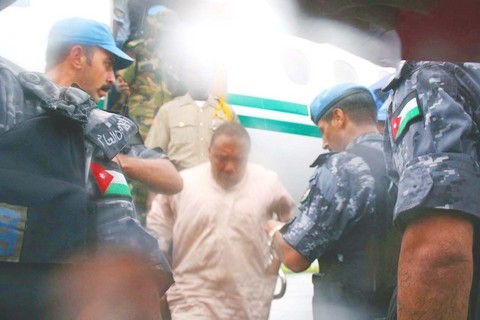Liberia's one-time warlord Charles Taylor was in the hands of Sierra Leone's tribunal yesterday, where he is set to become the first-ever African head of state tried on war crimes charges by an international court.
Taylor has been indicted by the UN-backed tribunal on 11 counts of crimes against humanity stemming from his support for brutal rebels in Sierra Leone. His arrival in handcuffs at the court on Wednesday represented a watershed moment for West Africa, a region long shaken by Taylor's warmaking.
"Today is a momentous occasion, an important day for international justice, the international community and above all the people of Sierra Leone," said Desmond de Silva, chief prosecutor of the tribunal called the Special Court.

PHOTO: AP
"His presence in the custody of the Special Court sends out the clear message that no matter how rich, powerful or feared people may be, the law is above them," de Silva said.
Nigerian police captured the exiled former Liberian president late on Tuesday as he tried to leave Nigeria, where he has lived in the south since stepping down from power during a 2003 rebel attack. He was caught trying to slip across the northern Nigerian border with Cameroon with his son, an aide-de-camp and a local guide, along with two 50kg sacks filled with US dollars and euros, Nigerian police official Alhaji Mohammed Aminu Bello said.
UN peacekeepers ferried Taylor by helicopter to the court, where de Silva said he was read his arrest warrant and would make his first court appearance by the end of this week.
Taylor joined nine other defendants, also charged with crimes committed during Sierra Leone's brutal 1989-2002 civil war. Taylor, a bombastic speechmaker during his time in the bush and as Liberia's president, made no comment.
The charges against Taylor stem from his support of the Revolutionary United Front rebels that terrorized civilians in Sierra Leone for years, chopping off the arms, legs, ears and lips of their victims.
On March 3, 2003, Taylor was indicted on 17 counts alleging war crimes, crimes against humanity and other serious violations of international humanitarian law for backing the rebels during the war. De Silva said that on March 16, 2006, the judge of the Special Court approved an amended indictment of 11 counts, which he said "will ensure a more focused trial."
The court began trials in 2004, but Taylor was their highest-profile defendant and the first African head of state to face trial on war-crimes charges.
Meanwhile, the US is seeking to move the war crimes trial of Taylor from Sierra Leone to the Netherlands for security reasons, US officials said.
US Ambassador John Bolton said that Taylor would remain under the jurisdiction of the Special Court, "but where he is physically may be somewhere else. The court's jurisdiction is not tied to a particular physical location."
Bolton said where Taylor goes for trial "will be determined in a few days."

A feud has broken out between the top leaders of the far-right Alternative for Germany (AfD) party on whether to maintain close ties with Russia. The AfD leader Alice Weidel this week slammed planned visits to Russia by some party lawmakers, while coleader Tino Chrupalla voiced a defense of Russian President Vladimir Putin. The unusual split comes at a time when mainstream politicians have accused the anti-immigration AfD of acting as stooges for the Kremlin and even spying for Russia. The row has also erupted in a year in which the AfD is flying high, often polling above the record 20 percent it

Ecuadorans are today to vote on whether to allow the return of foreign military bases and the drafting of a new constitution that could give the country’s president more power. Voters are to decide on the presence of foreign military bases, which have been banned on Ecuadoran soil since 2008. A “yes” vote would likely bring the return of the US military to the Manta air base on the Pacific coast — once a hub for US anti-drug operations. Other questions concern ending public funding for political parties, reducing the number of lawmakers and creating an elected body that would

The latest batch from convicted sex offender Jeffrey Epstein’s e-mails illustrates the extraordinary scope of his contacts with powerful people, ranging from a top Trump adviser to Britain’s ex-prince Andrew. The US House of Representatives is expected to vote this week on trying to force release of evidence gathered on Epstein by law enforcement over the years — including the identities of the men suspected of participating in his alleged sex trafficking ring. However, a slew of e-mails released this week have already opened new windows to the extent of Epstein’s network. These include multiple references to US President Donald

CHARGES: The former president, who maintains his innocence, was sentenced to 27 years and three months in prison for a failed coup bid, as well as an assassination plot Far-right former Brazilian president Jair Bolsonaro is running out of options to avoid prison, after judges on Friday rejected his appeal against a 27-year sentence for a botched coup bid. Bolsonaro lost the 2022 elections and was convicted in September for his efforts to prevent Brazlian President Luiz Inacio Lula da Silva from taking power after the polls. Prosecutors said the scheme — which included plans to assassinate Lula and a top Brazilian Supreme Court judge — failed only due to a lack of support from military top brass. A panel of Supreme Court judges weighing Bolsonaro’s appeal all voted to uphold